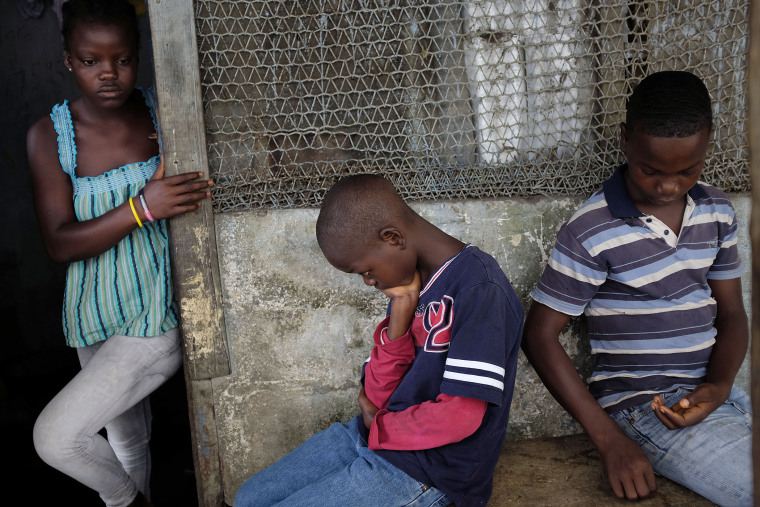With every passing moment of Ebola’s deadly march, another child’s fate is thrown into uncertainty.
To date, the current epidemic has claimed the lives of over 5,400 people in West Africa, according to the World Health Organization (WHO), with over 15,000 confirmed cases. The countries primarily affected include Liberia, Guinea, and Sierra Leone -- home to 2.5 million children under the age of five.
For them, the risks are twofold: contracting Ebola themselves, or growing up without their parents. Some children experience both, fortunate enough to survive the disease, but faced with returning to the world as orphans.
RELATED: American nurses head to Liberia to fight Ebola
“As we’ve seen Ebola progress and change over the past few months, what we’re starting to realize is that there are a really high number of children left orphaned,” said Kristen Barredo, a World Vision program officer working on the Ebola crisis, to msnbc. “The big need that we have now is to identify who these kids are, document them, and support unaccompanied children so they can find relatives in other parts of the country.”
"The big need that we have now is to identify who these kids are, document them, and support unaccompanied children so they can find relatives in other parts of the country."'
Nearly 4,000 children in West Africa have lost one or both parents to Ebola since the start of outbreak -- the worst in the disease’s history -- according to UNICEF estimates. And while there has been a reported halt in intercountry adoptions from the impacted region, humanitarian groups are far more concerned about the epidemic’s effect on long-treasured kinship networks, which social workers have traditionally tapped to take in Africa’s orphans. Afraid and unsure of how Ebola spreads, neighbors and extended family members of orphaned children have been more resistant than usual to provide homes for the newly homeless.
“One of the things that we were seeing during the peak of the Ebola response, when the cases were multiplying, was that there were issues of communities’ becoming very fearful to take in children,” said Amy Richmond, child protection adviser at Save the Children. “It was difficult to mobilize foster families.”
If left on their own without family-based care, orphaned children face extreme risks in Africa, both in terms of their intellectual and psychological development, as well as in terms of their physical well-being.
“Imagine how vulnerable a child is when they have no protective care. They could disappear and no one would know it,” said Tom DiFilipo, president and CEO of the Joint Council on International Children’s Services. “We could try to combat sex trafficking and child labor, but if we could prevent that in the first place, isn’t that better?”
RELATED: More travel restrictions for West Africa
Fortunately, while Ebola’s rampage is far from over, charities and humanitarian groups have made some headway in reducing the stigma surrounding survivors. Once people are made aware that Ebola spreads only through direct contact with the bodily fluids of an infected person, they’re less likely to shun those orphaned by the disease.
“One of the most important things is to get the right message about how this is contracted, really flood the market with information, because it’s ignorance and fear that cause the kind of stigma we’ve seen historically,” said Susan Bissell, UNICEF’s chief of child protection. “Once you’ve gone through [Ebola] and you get well, you can’t get it again.”
Groups on the ground are working with community leaders, houses of worship, even homegrown celebrities -- such as disabled Guinean dancer, Sidiki Conde -- to spread the word on how to prevent Ebola’s transmission, and to advocate on behalf of children who’ve lost one or both parents. Using lessons learned during the height of the HIV/AIDS crisis -- an epidemic that left millions orphaned in sub-Saharan Africa -- humanitarian aid workers are tracking down relatives of orphaned children, and providing clothing, food, and other forms of support to people caring for their extended family.
Additionally, they’re working to supply hygiene and protective equipment to households that are hosting so-called “contact children,” or kids who have tested negative for Ebola but must undergo strict monitoring for 21 days -- the disease’s incubation period -- because their parents tested positive.
So far, cases of orphans being rejected by kin have decreased in Liberia, though it remains more of a problem in Sierra Leone. “We’re not 100% sure why that happened,” said Richmond of Liberia’s progress. “Overall, it’s an unprecedented situation and it’s changing weekly.”
RELATED: Bill Gates pledges millions to support Ebola-affected countries
Moving forward, frontline workers plan to follow up on foster care placements by building a strong case management system for children living with extended family. Charities like World Vision also hope to expand programs that place personal protective equipment in the home.
But the work doesn’t end there. Beyond ensuring the physical health and safety of Ebola orphans, humanitarian groups stress the need for psychosocial support services to address the trauma of losing family members so suddenly. Plus, they’re strategizing ways to facilitate access to education in the wake of mass school closures across the affected countries.
“This is definitely one the greatest challenges of our time,” Bissell said.
